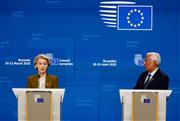Op-Ed: A Complicated Act
By AHEPA Supreme President George G. Horiates, Esq.🕛 χρόνος ανάγνωσης: 7 λεπτά ┋

The Eastern Mediterranean Security and Energy Partnership Act provides the framework for enhanced United States relations with Greece, Cyprus, and Israel. The recognition by United States policymakers of the strategic importance of the trilateral partnership to U.S. interests is to be lauded. So, too, is the Act’s expressed statement of policy for the United States to participate actively in the tripartite dialogue.
The Act’s introduction in the U.S. Senate (S.1102) coincided with good timing. Introduced the day prior to the AHEPA family’s annual Capitol Hill Day, our advocates were able to convey the community’s appreciation to key staffers of the bill’s sponsors, U.S. Senators Robert Menendez (D-NJ) and Marco Rubio (R-FL); flag it for other senate offices to consider; and tee-up cosponsors in the U.S. House of Representatives in anticipation of its introduction that occurred in May. Many of those representatives have become co-sponsors. However, as with all pieces of legislation, they are not perfect, and that is to be expected. As AHEPA’s grassroots advocates raised awareness of the Act, AHEPA also worked with congressional staff to strengthen the senate’s version of the bill since its introduction. (In addition to AHEPA, other non-foreign agent entities that specifically reported lobbying on the Act during the second quarter of 2019 were the American Jewish Committee and ExxonMobil.) For example, one provision in the original Senate bill authorized fiscal year 2020 funding for International Military Education and Training (IMET) assistance for Greece, and for the first time, the Republic of Cyprus. AHEPA appreciated the bill’s sponsors making U.S.-Greece and U.S.-Cyprus military-to-military relations a priority in a comprehensive piece of legislation. Yet, if the Act’s purpose is to lay the groundwork for a more enduring, lasting U.S. partnership in the eastern Mediterranean, AHEPA contended IMET assistance must be sustained and done so with meaningful increases in investment.
That’s why AHEPA advocated for the authorization of appropriations for Greece and Cyprus’ IMET assistance to be longer than one fiscal year.
- The amended version of the senate bill the Senate Foreign Relation Committee advanced out of committee did just that, authorizing IMET appropriations over three fiscal years (2020 to 2022) with modest increases in each of those fiscal years amid a tough budgetary environment in Washington.
- AHEPA thanks Senator Menendez, and the Senate Foreign Relations Committee staff, for agreeing to strengthen this provision in the Act. This improvement is appreciated. However, AHEPA has a concern about a provision of the Act as amended by the Senate Foreign Relations Committee. For example, although the Senate’s amended version of the Act provides a mechanism for lifting the arms prohibition on Cyprus—a much needed “next step” if U.SCyprus defense relations are to deepen—it does so based upon two conditions that did not exist in the original version of the Senate bill. The conditions are that:
- “(A) the Government of the Republic of Cyprus is continuing to cooperate with the United States Government in efforts to implement reforms on anti-money laundering regulations and financial regulatory oversight; and
- “(B) the Government of the Republic of Cyprus has made and is continuing to take the steps necessary to deny Russian military vessels access to ports for refueling and servicing.” These conditions clearly come with the Act’s aim throughout the bill to counter Russian influence in the eastern Mediterranean. However, Cyprus has demonstrated progress with its anti-money laundering efforts as a senior U.S. Treasury Department official stated in April 2019.
- And it can be argued condition “B” infringes on the sovereignty of the Republic of Cyprus. Cypriot President Nicos Anastasiades referred to the amended version of the bill as “unfortunate.”
- It is in the best interest for the United States for the Republic of Cyprus to be firmly planted in the West. November 2018’s Statement of Intent agreement between the U.S. and Cyprus to strengthen and develop the bilateral security relationship is further evidence of Cyprus’ Western orientation.
However, the geopolitical reality of the Cyprus problem presents the need for Cyprus to maintain as many viable working relationships on the international stage as possible. Moreover, although the Act would provide the President of the United States with the ability to waive the limitations on the transfer of arms based on the national security interests of the United States, the waiver would last one fiscal year.
To further complicate matters, legislators in the Senate and the House of Representatives “lifted” this amended provision with the two conditions on lifting the Cyprus arms prohibition from the Eastern Mediterranean Security and Energy Partnership Act and included it in a “must-pass” piece of legislation, the annual defense authorization bill. Although the defense bill is not without its own separate set of contentious provisions in a divided Washington, it certainly will pass and become law.
Other provisions of the Eastern Mediterranean Security and Energy Partnership Act that Congress must address—either in the House of Representatives or when differences are reconciled in a conference committee should it get there—include:
- how will the Secretary of State determine when Greece’s airspace is violated when the Secretary must issue their report;
- a reporting of Russia’s “soft power” influence in the eastern Mediterranean through cultural or philanthropic means as part of the bill’s broader “Report on Russian Federation Malign Influence in the Eastern Mediterranean;” and
- providing the relevant federal agencies with the resources needed to establish the joint U.S.-Eastern Mediterranean Energy Center. It is the latter that is most critical to address of the three. If the eastern Mediterranean is to be a “means of diversifying regional energy needs away from the Russian Federation” as stated in the Act’s statement of policy provision, then Congress must be more certain about the Center’s establishment and provide an authorization of appropriations (funding) over several fiscal years to ensure the policy’s success. In the meantime, S.1102, as amended, awaits action on the Senate Floor.
It’s House version, H.R.2913, still in its original form, has 38 co-sponsors. H.R.2913 has been referred to five House committees for consideration. Curiously, none of which is the Energy and Commerce Committee. Despite these concerns, AHEPA will continue to raise awareness of the broader, overall significance of U.S. engagement in the eastern Mediterranean. Further, AHEPA will continue to identify opportunities to strengthen the Act during the legislative process
Διπλό φονικό στο Αίγιο: O δράστης παραδόθηκε στις Αρχές
Συναγερμός στο Παλαιοχώρι Ηλείας: Έκρηξη στο πεδίο βολής του στρατοπέδου - Αναφορές για τραυματίες
Σε κλίμα έντασης η συζήτηση στη Βουλή για την παραπομπή Τριαντόπουλου: Κόντρες και αποχωρήσεις
«Deal ή αντιμέτρα»: Η ΕΕ τρέχει να αξιοποιήσει το διάστημα 90 ημερών που έδωσε ο Τραμπ
Live όλες οι εξελίξεις λεπτό προς λεπτό, με την υπογραφή του www.ethnos.gr
 δημοφιλές τώρα:
δημοφιλές τώρα: 









